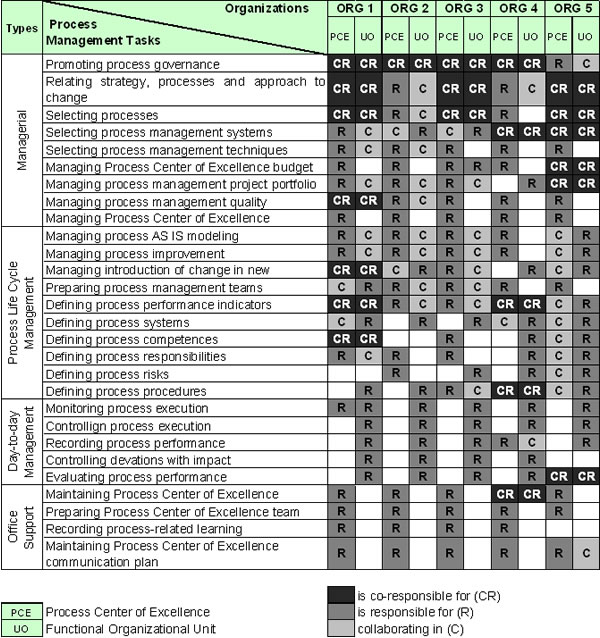1. INTRODUCTION
Organizations have been trying to define who will be accountable for process management tasks[1]. This definition can: improve business performance; balance the power distribution among organization units; and engage important and different internal stakeholders. My previous articles provide guidelines on how to design the process center of excellence – PCE [3] [5]. This article provides guidance to support the decision on which organization unit can be responsible for the activities in the process management value chain. You will find a matrix showing the type of relationship taken by the process center of excellence and / or functional organization units (as like Operations, Sales, IT and Finances). Table 1 presents how 5 different Brazilian important organizations: Abn Amro. Embraer, Natura, Serasa and Vale. These organizations have defined who is responsible for, provide support to or is co-responsible for process management activities. The paper is the third of four and is intent to provide insights to other organizations.
2. WHO DOES WHAT: PCE AND ORGANIZATIONAL UNIT
In some organizations, certain process management tasks are performed via partnerships characterized by both parties involved acting jointly. Based on previous work[2], Table 1 summarizes information about process management tasks distribution, showing those responsible for (R); collaborating in (C) and co-responsible for (CR) each of the process management tasks specified in the study. With these data it is possible to perceive the focus of the process office’s activities in each organization and, from the activities of both its process office and the organizational units responsible for processes, to estimate how far each company is process-oriented.
From the data collected it can be seen that only organization 5 is responsible for actually carrying out process governance, which is, in the majority, the responsibility of the business units. As regards relating strategy and process selection, only one has total control. None of them controls process execution, although they do monitor processes and evaluate process performance.
In only one of the organizations does the process office enjoy a major degree of autonomy in process management, and has normative and regulatory authority. In this case, it overlaps into the coordination and control of activities and resource allocation that take place in organizations’ day-to-day operations. The others play an essentially normative role focused on work project design, and directed towards inventorying, improving and introducing new processes.
It can be seen from Table 1 that there are different models of process management, which range from a logic that is primarily functional, through functional management of cross-functional processes, to include even by-process management [5].
Table 1. – Process management activities in organizations participating in the research. Source: [3]
 |
3. Findings and conclusions
This article presented some examples of who can be take responsibility over process management activities. The responsibility matrix defines which organization unit does what in process management. The matrix is an important instrument to guide process management governance.
The overall conclusion, at least within this sample of five Brazilian cases, was that the process office is responsible for promoting process management and defining methods for it. Moreover, process offices mainly acted in a process management support function, monitor process execution and provides metrics to evaluate functional organizational units. It is, also, possible to conclude that the distribution of process management activities among different organization units is an important way to engage and promote involvement across the organization.
Once again, organization shall analyze table 1 and decide how to adapt it to their specific reality. These case studies revealed that PCE are in most of cases responsible for process design out of a day-to-day base. In only one case, the PCE is responsible for day-to-day activities.
The previous papers presented a PCE value chain and three process management managerial models. The last paper will present PCE organization structure scenarios. This study was conducted by a team composed by Rafael Paim, Vanessa Nunes, Bruno Pinho, Flavia Santoro, Claudia Cappelli and Fernanda Baiao from GEOS/Cefet-RJ, Np2tec/Unirio & GPI/UFRJ.
4. REFERENCES
[1] Harmon, P., Wolf, C., The State of Business Process Management, Business Process Trends, In: www.bptrends.com, 2006, 2007, 2008.[2] Paim R, Caulliraux H, Cardoso R. Process Management Tasks: a conceptual and practical view. Business Process Management Journal 2008; Vol 14, N. 5, p. 694-723.[3] Paim, R., et. al, 2009, “Structuring a Process Management Center of Excellence”. In: The 6th Organizational Engineering Track at ACM SAC 2009, Hawaii.[4] Paim, R. Structuring a Process Management Center of Excellence: the Value Chain. BPMInstitute, February, 23, 2009.[5] Paim, R. Structuring a Process Management Center of Excellence: three managerial models. BPMInstitute, June, 04, 2009.

















